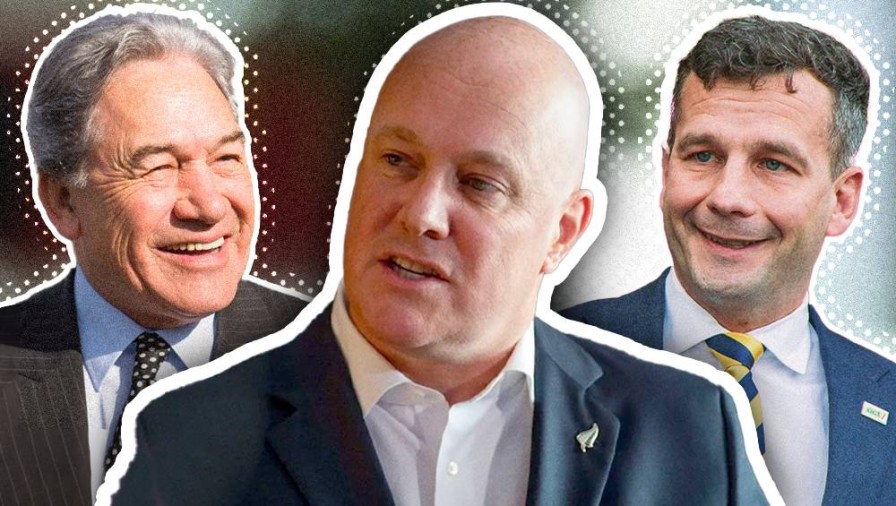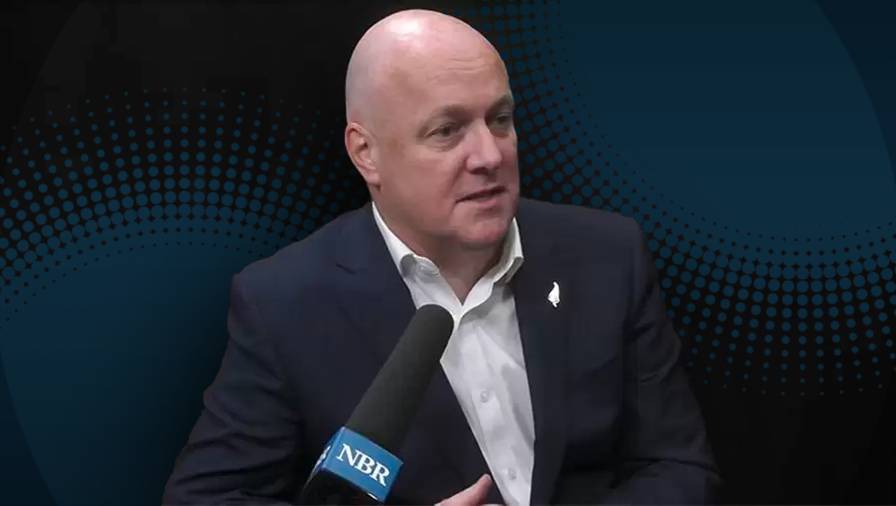

Baubles of power, coalition talks, Labour’s view on Gaza
Arguments over ministerial posts delayed a government announcement this week.
WATCH: NBR political editor Brent Edwards speaks with Grant Walker.


Arguments over ministerial posts delayed a government announcement this week.
WATCH: NBR political editor Brent Edwards speaks with Grant Walker.
Surely it must have always been scripted that New Zealand First leader Winston Peters would be the last of the leaders to get on a plane to Wellington after days of coalition negotiations in Auckland.
While National leader and incoming Prime Minister Christopher Luxon and Act leader David Seymour flew out late Wednesday night, Peters did not follow them until late the next morning. It was all the confirmation the country needed that a deal was all but done, and late Thursday it was confirmed, even if we have to wait until today for the details.
Luxon started the ball rolling at the beginning of the week, saying the policy issues had been sorted out and all the leaders had to do was decide on ministerial allocations. The announcement from Luxon – who had always said he would not announce anything and instead conduct coalition negotiations in a more professional way than his predecessors – appeared to annoy Seymour, who said Luxon had eaten too much Weet-Bix for breakfast.
Later, reporters were told there were only a couple of outstanding issues to resolve, and it soon became clear one of them was who should be Deputy Prime Minister. Seymour made a public bid for the job, saying that, as leader of the party that had won more votes than New Zealand First, he should get it.
Peters remained grumpily quiet but, for the man who has been in politics since the late 1970s and Deputy Prime Minister twice before, Seymour’s presumption would have appeared, well, presumptuous. Luxon turned the tables on Seymour, saying maybe he’d had too much Weet-Bix.
But Luxon exposed his political naivety again when he tried to downplay the spat by describing the job of Deputy Prime Minister as “ceremonial”.
He might want to read the Cabinet Manual, which he is so adamant all his ministers will adhere to.

Winston Peters, Christopher Luxon, and David Seymour have continued negotiating the coalition agreement this week.
“If the Prime Minister is unavailable or unable to exercise the statutory or constitutional functions and powers of the office, the Deputy Prime Minister can, if necessary, exercise those powers and functions,” it says.
The Deputy Prime Minister is acting Prime Minister at home when the Prime Minister is overseas or when they are unavailable for other reasons. Peters will remember well when he was acting Prime Minister for six weeks from June 21 to August 2 when then Prime Minister Jacinda Ardern took maternity leave after the birth of her daughter. He knows it is not a ceremonial role. At the same time, the Deputy Prime Minister almost always stands in for the Prime Minister at Question Time on Thursdays when Parliament is sitting.
Peters is also likely to be Foreign Affairs Minister, with his deputy Shane Jones likely to take some economic role, certainly around regional economic development.
Some in the agriculture sector have heard former Federated Farmers president and newly elected Act MP Andrew Hoggard might be Minister of Agriculture. That, though, has apparently been another of the sticking points in the coalition negotiations.
Seymour will presumably be the new Minister of Regulation but will also want some other hefty economic role to back that up. Act will also want at least an associate role in education to help shepherd through a resurrection of its charter schools policy.
Among all the negotiations around ministerial positions, it would seem extraordinary if a so-called ‘ceremonial’ position was the last hold-up to Luxon, Peters, and Seymour being able to announce the formation of the new Coalition Government.
Talks have dragged on, but largely because Luxon himself created the perception that, because of his former life in business, particularly as a chief executive, he knew how to negotiate and get things done. None of it has happened as quickly as he might have suggested.

National leader Christopher Luxon.
Luxon should have put more focus on his commitment to creating a strong, stable government. Doing that takes time and no-one should be unduly surprised it has taken this long.
Senior National MP Chris Bishop has confirmed Parliament will not sit next week – because it has taken this time to form a government – which means there will be only three weeks left before Christmas. The first of those parliamentary sitting weeks will be consumed by the opening of Parliament and the subsequent debate in response to the speech from the throne, which gives all new MPs the opportunity to deliver their maiden speeches.
So, it will not be until the second week that Parliament might get on to business of urgency for the new Government. Just how much it can do will be open to question, given the Cabinet will have to meet, get policy advice, and then make decisions. New legislation, for instance, will not be written overnight.

Parliament will not sit next week.
Meanwhile, caretaker Prime Minister Chris Hipkins did an unusual thing and announced the Labour Party’s position on the conflict in Gaza at a press conference as Labour leader. In it he called for a ceasefire, having not ever gone that far with his PM’s hat on. The caretaker Government had carefully consulted the National Party on its response to the ongoing Israeli bombardment of the Gaza strip and adopted diplomatic language largely in line with key allies.
But there is a growing public mood for a ceasefire as the number of Palestinians killed, particularly children, continue to rise. It is likely Hipkins and other senior Labour figures would have come under pressure from party members to be more forthright in their statements. The caretaker Government had apparently wanted to make such a statement, but National would not agree.
Soon, though, the new Government will be in place, and it will then be able to clearly voice New Zealand’s view on what is happening in Gaza. It is unlikely to take up Labour’s position.
When it comes to the wide range of other policy matters, the shadow boxing is about to end and New Zealanders will see clearly what the new Government means for them.
Brent Edwards is NBR’s political editor.